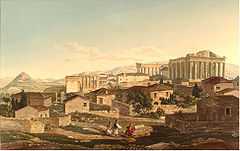Edward Dodwell
| Edward Dodwell | |
|---|---|
 | |
| Born |
November 30, 1767 Dublin, Ireland |
| Died |
May 13, 1832 (aged 65) Rome, Italy |
| Occupation | Writer, painter |
| Nationality | Irish |
| Genres | travel literature |
| Spouse(s) | Giraud |
Edward Dodwell (1767 – 13 May 1832) was an Irish painter, traveller and a writer on archaeology.


Dodwell was born in Ireland and belonged to the same family as Henry Dodwell, the theologian, and was educated at Trinity College, Cambridge.[1]
Dodwell travelled from 1801 to 1806 in Greece, which was then a part of the Ottoman Empire, and spent the rest of his life for the most part in Italy, at Naples, and Rome. He died at Rome from the effects of an illness contracted in 1830 during a visit of exploration to the Sabine Mountains. Dodwell's widow, a daughter of Count Giraud, thirty years his junior, subsequently became famous as the "beautiful" countess of Spaur, and played a considerable role in the political life of the papal city.
Dodwell published A Classical and Topographical Tour through Greece (1819), of which a German translation appeared in 1821; Views in Greece, with thirty colored plates (1821); and Views and Descriptions of Cyclopian or Pelasgic Remains in Italy and Greece (London and Paris, with French text, 1834).
References
- ↑ "Dodwell, Edward (DDWL795E)". A Cambridge Alumni Database. University of Cambridge.
External links
| Wikisource has original text related to this article: |
 This article incorporates text from a publication now in the public domain: Chisholm, Hugh, ed. (1911). Encyclopædia Britannica (11th ed.). Cambridge University Press
This article incorporates text from a publication now in the public domain: Chisholm, Hugh, ed. (1911). Encyclopædia Britannica (11th ed.). Cambridge University Press
| Wikimedia Commons has media related to Edward Dodwell. |
|